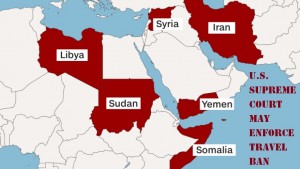
Supreme Court Rules Trump May Enforce Travel Ban
Since Donald Trump has become the President of the U.S., there has been continuous speculation about travel bans towards Muslim-majority countries. This has caused an enormous amount of discussion and concern for many Americans as several of them have immigrated to America from these countries. Recently the U.S. Supreme Court has ruled that Trump’s travel ban, which targets six Muslim-majority countries, may possibly go into effect. This is specifically with respect to any foreign national who lacks any bona fide relationship with a person in the United States. Therefore, in this article, I will address who will be affected by this travel ban and when it will come into effect.
Who will be affected & when will it come into effect
The travel ban is specifically targeting citizens from Iran, Libya, Somalia, Sudan, Syria and Yemen. The travel ban, as stated by Donald Trump, will come into effect within three days of the court ruling. The travel ban excludes any foreign nationals, from these designated countries, in relationships with citizens or permanent residents of the U.S. However, any foreign national that wishes to travel to the U.S. with an accompanying visa, who had never visited the U.S. before, has no family in the U.S., or any business or other ties, may be prohibited from entering.
The new order is speculated to explain the ties each of the six countries has with terrorist organizations. For instance, Iran’s support of terrorist groups such as Hezbollah and Hamas, ISIS activities in Libya, al-Qaeda offshoot operating in Yemen, and the active combat ongoing in Syria and Libya have made these countries targets of the travel ban. Therefore, as a result of these ties, immigrants from these countries cannot be adequately vetted.
It is important to note that the U.S. Supreme Court can overturn lower court orders that have attempted to block the implementation of the travel ban; the U.S. Supreme Court is the highest federal court in the U.S. and therefore is permitted to do so.
There was an order made on March 6, which followed an order previous made that included Iraqi citizens, announced a 90 day travel ban on travellers from the six aforementioned countries, as well as a 120 day ban on all refugees. Going forward, Syrians will no longer be subject to an indefinite ban, as they were in the first order. Additionally, Iraq will not be included in the newest travel ban as there have been negotiations between the Iraqi government and the American government. Iraq has consequently vowed to improve the security of its travel documents and share more information on its citizens with the U.S. government. This order was supported by the U.S. government as they believed it would enforce stronger vetting procedures to be implemented going forward. Furthermore, the U.S. Supreme court will hear a handful of cases in which lower courts have blocked the travel bans; however, there is no guarantee that these arguments will come out successful. The previous bans are said to be going into effect this summer.
Consequences of the Travel Ban
This travel ban unfortunately will cause confusion and concern for many Americans and prospect visitors to the U.S. Due to the previous speculation and discussion within the past few months of Trump’s administration, there is no doubt that there will be more confusion and discussion going forward. Two justices from the U.S. Supreme court have confirmed that it will be very difficult to determine who exactly has a bona fide relationship with the U.S. A bona fide relationship includes parents, children, in-laws and step-relations but does exclude grandparents, nephews, nieces, cousins, and others. Additionally, fiancés were originally placed in the excluded group of family members, however, as of recently they are now determined to be a bona fide relationship. Therefore, it is extremely important for the individual to have a clear understanding of who classifies under a bona fide relationship. This will place a significant burden on any executive official who is entitled to decide whether an individual who is attempting to enter the country from any of the six aforementioned countries indeed has a sufficient and genuine connection to a person or entity within the U.S.
In the U.S., there have been several cases where individuals who had valid visas to enter the U.S. were denied entry and in some extreme cases, their visas were cancelled. These decisions were ultimately made by U.S. border officials. Trump is extremely enthusiastic and adamant about the travel ban. He states that it is in fact a victory for American security.
On the other hand, for Americans and American travellers, this travel ban can be extremely detrimental. Many individuals believe that the travel ban is, in contrast, illogical, discriminatory, and very un-American. Others find it extremely exclusionary to determine which relationships are bona fide and which are not. This can cause extreme heartbreak if grandparents or grandchildren are banned from the U.S. due to their relationships not being bona fide. As a result, there are several sentiments from individuals who believe that these exclusions will not make the country safer and it will cause further conflict going forward.
Contact Akrami & Associates to Petition for your Spouse
For more information on U.S. matters and different visa applications you can submit, please refer to our different blogs. For any visa in the U.S. it is highly recommended that you seek out professional and experienced help before attempting to submit the application. Here, at Akrami & Associates, we work and have experience with many different immigration issues. We have helped many of our client visit the United States. If you believe that you may be eligible to apply for a visa to the U.S., please feel free to contact Akrami & Associates at our office at 416-477-2545 for more information or if you would like to book a consultation with an immigration professional for more advice.
With Akrami & Associates, there is always a way!